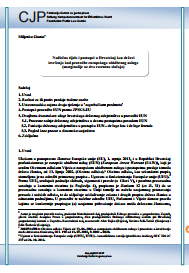Nadležna tijela i postupci u Hrvatskoj kao državi izvršenja kod provedbe europskoga uhidbenog naloga (marginalije uz dva recentna slučaja)
Competent authorities and procedures in Croatia as a state of enforcement in the execution of the European Arrest Warrant (marginalia with two recent cases)
Author(s): Miljenko Giunio
Subject(s): Law, Constitution, Jurisprudence, Criminal Law, International Law, Public Law, EU-Legislation
Published by: Fondacija Centar za javno pravo
Keywords: Public law; constitution; Constitutional Court; European arrest warrant; Republic of Croatia; legal framework; EUN;
Summary/Abstract: On 13th June 2002 the Council of the European Union adopted the Framework Decision on the European arrest warrant and the surrender procedures between Member States. The Republic of Croatia implemented the Decision in 2010 by the Law on Judicial Cooperation in Criminal Matters with the Member States of the European Union. The paper analyzes the provisions of the Law regulating the procedure of implementation of the warrant as well as the authorities who participate in the procedure, all in the context of two cases which, at the beginning of 2014, have intrigued the Croatian professional and wider public, but also the public outside Croatia. The paper problematizes the interpretation of the Framework Decision and the Croatian Law respectively, in connection with the grounds for denial of implementation of the arrest warrant, specifically the grounds stated in the two reviewed proceedings. The paper also analyzes the decision of the Constitutional Court of the Republic of Croatia rendered in one of the cases, in connection with possible violation of human rights and fundamental freedoms and concludes that there were grounds for a different decision. The paper analyzes the position of the State Attorney’s Office in the surrender procedure and gives a critical assessment of the solution of the Croatian legislator, particularly in comparison with the Slovenian example. In any case, the Framework Decision and the Law (which must follow the Decision) do not allow the state of execution much maneuvering space to oppose the warrant, so the interests of the state of execution may be represented only by protecting the legal order and insisting on respect of harmonized rules.
Series: Fondacija Centar za javno pravo - Analize
- Page Count: 15
- Publication Year: 2014
- Language: Croatian
- Content File-PDF
- Introduction

